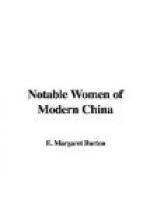But the intense heat of a South China summer and the things that it brings with it, make it impossible to keep the work going continuously in the present crowded quarters. Often it is the dreaded plague which necessitates the closing of the hospital doors. One morning Dr. Hue heard that the neighbour directly across the street from the hospital had been stricken with this fatal disease. She closed the hospital at once, and put up a notice telling the patients why it was necessary to close, and assuring them that she would begin work again as soon as it was safe to do so. The next morning the notice had disappeared, and another one which was put up disappeared as promptly. An explanation of this was afforded Dr. Hue, by a remark which she overheard: “How can we stand having this hospital closed? We took the notice down in hope that the hospital would be opened.” But when the plague is prevalent, the closing of the hospital is the only safe course to pursue; for one person, coming into the dispensary suffering from this disease, may do more harm in a few minutes than could be undone in many weeks.
A common and gracious way of expressing appreciation in China is the presentation of an honorary tablet, to be set up in one’s reception room, on which is written an appreciation of the achievements of the recipient. These are constantly bestowed upon Dr. Hue by those patients who are wealthy enough to express their gratitude in this fashion.
A few years ago fire broke out in the middle of the night not far from the hospital. It burned up to the west wall of the hospital and all along the length of the wall, completely destroying all the houses in front of it. Then it was that the Chinese gave expression in very concrete form to their appreciation of their fellow-countrywoman, and the work which she was doing in that hospital. Dr. Hue says that the building might have been reduced to ashes in a moment had it not been for the faithful efforts of those who “were more willing to have their faces scorched and burned than to leave their work undone,” and who laboured to such effect that nothing but the roof was seriously damaged. After the danger was over the people poured in to express their sympathy, and offer their congratulations that the damage was no greater, some of them bringing pots of tea and dishes of food. “This may not seem very wonderful to the people in a Christian country,” says Dr. Hue, “but if you knew how the people usually are treated at such times you will agree with me when I say ‘Wonderful.’” Fire is usually interpreted as an expression of the displeasure of the gods, and it is considered discreet not to interfere.




